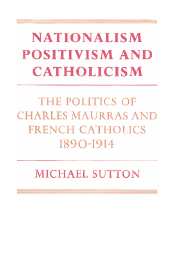 Nationalism, Positivism and Catholicism
Nationalism, Positivism and Catholicism Book contents
- Frontmatter
- Contents
- Dedication
- Acknowledgements
- Introduction
- 1 Maurras's appreciation of Comte
- 2 Individualism, the decline of France, and Maurras's proposed remedy
- 3 The time of the separation of Church and State
- 4 Blondel and Maurras
- 5 Laberthonnière's separation between politics and Christian faith
- 6 Orthodoxy and Rome
- Epilogue
- Notes
- Index
- Cambridge Studies in the History and Theory of Politics
Introduction
Published online by Cambridge University Press: 22 September 2009
- Frontmatter
- Contents
- Dedication
- Acknowledgements
- Introduction
- 1 Maurras's appreciation of Comte
- 2 Individualism, the decline of France, and Maurras's proposed remedy
- 3 The time of the separation of Church and State
- 4 Blondel and Maurras
- 5 Laberthonnière's separation between politics and Christian faith
- 6 Orthodoxy and Rome
- Epilogue
- Notes
- Index
- Cambridge Studies in the History and Theory of Politics
Summary
‘Maurras is driven by two obsessions, to combat Romanticism and to combat the Revolution. They are, for him, a break with our traditions. And so with pitiless clairvoyance he seizes on everything that encourages this double disorder.’ So wrote Maurice Barrès in 1905 of his friend, Charles Maurras. Barrès's remark was percipient enough: nonetheless, the author of Le Culte du moi could have added that, in Maurras's eyes, romanticism and the ideas of 1789 were but two aspects of the same ill, namely an individualism that exaggerated the dignity and significance of the individual person to the detriment of the social and political order of which the individual is a mere part. Individualism was the central obsession of Maurras that encompassed all others and, indeed, in his concern with what he viewed as the maladies of the narcissistic conscience and the egocentric self, his more important aesthetic, political and religious ideas assumed a coherence and interdependence that preclude a sharp delineation of the political element of his thought.
It was with a view to combating the pernicious effects of individualism, especially in the political sphere, that, from about the time of the Dreyfus Affair, Maurras nurtured the idea of an alliance between Positivists and Catholics. This was a development on Maurras's part of Auguste Comte's bizarre idea, at the close of his life, of forging an alliance with the Jesuits, the outcome of which was a comic fiasco. Maurras, however, within the framework of the Action Françhise, had somewhat more success.
- Type
- Chapter
- Information
- Nationalism, Positivism and CatholicismThe Politics of Charles Maurras and French Catholics 1890–1914, pp. 1 - 10Publisher: Cambridge University PressPrint publication year: 1982
